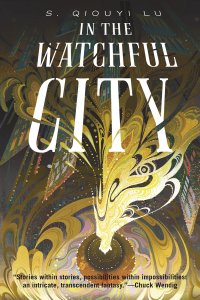Paul Di Filippo Reviews In the Watchful City by S. Qiouyi Lu
 In the Watchful City , S. Qiouyi Lu (Tor.com 978-1250792983, 192pp, $14.99) August 2021.
In the Watchful City , S. Qiouyi Lu (Tor.com 978-1250792983, 192pp, $14.99) August 2021.
Close as I can discern, S. Qiouyi Lu began their career circa 2016, with a story in Strange Horizons titled “Her Sacred Spirit Soars.” (Although their CV does list a poem from one year earlier, “Particularities.”) In either case, the succeeding short span of years have been filled with a respectable number of tales from their keyboard, earning the author some well-deserved kudos. Now comes their longest work to date, this novella from Tor.com, which the author, in a sparkling short interview, describes as “Minority Report meets 1,001 Nights!” Indeed, that not-quite-serious elevator pitch captures the essence of this compact but deep and colorful tapestry, a fusion of biopunk SF frame tale—with its focus on the benefits and curses of our modern technocentric lifestyle and culture—with older narrative concerns and structures, hewing to more archetypical, eternal, fabulaic matters.
The novella has a very nice, classic structure and engine, seen most famously in Bradbury’s The Illustrated Man. An enigmatic, not entirely beneficent figure interacts with a viewpoint protagonist, evoking through a magical medium a flight of self-contained stories whose seemingly unrelated import nonetheless permeates the life of the main character in illuminating and edifying ways. (Other resonant instances of an allied trope—“Mysterious Visitor Arrives and Upsets People”—might be adduced in The Circus of Dr. Lao and Something Wicked This Way Comes.)
Let us get acquainted first with the figure at the core of our tale. That would be a person named Anima. Anima lives in the city of Ora, and is a most unique individual. Ae (to use one of Anima’s preferred pronouns) is confined mainly to a life-support tank and its enclosing room, being tethered physically to Ora’s Matrix-life cyberspace, the Gleaming. Via this powerful panoptic connection, Anima fulfills aer daily job, which is a combination of spy, ombudsman, cop, social worker and peacekeeper. Ae roams the city through the agency of aer animal servitors, into which ae uploads aer consciousness, jumping from one to another as needed.
One day on aer rounds Anima detects an unquantifiable, unrecorded stranger in town. This proves to be a fellow named Vessel, who is trundling around a cabinet of wonders called a qíjìtáng. The odd contents of this trunk produce full-immersion sensory trips when handled.
Soon Vessel has mysteriously penetrated Anima’s inner sanctum, and convince aer to sample the wares.
Anima stares, awestruck, as the trunk unfolds. Clasps undo with soft clicks; mechanisms turn deep in the heart of the trunk, unlocking drawers that slide out with a clean snap, like a fan opening with a single flick of the wrist. Partitions slide away, revealing staggered tiers of shelves, each holding peculiar items labeled with cards in an elegant, handwritten script….Vessel says nothing as the last sounds die away, allowing Anima a moment to take in the cabinet’s full size…. The sheer number of colors and textures and materials is a feast of sensory data that makes Anima’s head tingle. Warped glass bottles, curiously shaped stones, bundles of documents, glittering trinkets and ornaments, dried flowers still scented with fragile fragrances, textiles woven from unfamiliar threads, taxidermied animals
Curious as to the nature of this visitor and what ae can learn from the stranger, Anima consents. This results in four mind trips (see below), which are interleafed with Anima’s ongoing story, wherein ae has run-ins with a rival operator Enigma, witnesses a haunting suicide ae is unable to stop, and learns the real story about aer city of Ora and its relations to the dominant floating realms known the Skylands. By story’s end, Anima’s destiny has been completely reshaped, while Vessel too attains some release from ser psychopompic burdens.
The embedded stories are all richly rewarding and self-contained, and truly resonant with Anima’s condition and life-course. First comes “A Death Made Manifold”, which chronicles the attempt by a man named Hàkōng to necromantically revive a dead man from a sack of bones. “This Form I Hold Now” brings us the life of a girl named Chūnjú who eventually becomes a master at “combat skycups… a fairly new sport, derived from the solo dance performances that brought the sport to the eye of the general public.” Events in “The Sky and Everything Under” are conveyed interestingly in the form of documents from “The Empire of the Skylands Bureau of Investigations,” regarding a case of multivalent treason. And finally, the story I found the most touching, “As Dark as Hunger”, wherein our protagonist, Ellen, a reclusive woman living simply as a coastal gleaner, finds a mermaid and brings the creature home. This decision eventually involves her with an old lover intent on harvesting mermaids for their flesh. (These sea sirens, once a seemingly cliched trope, have enjoyed a renaissance lately, in such tales as Alyssa Wong’s “The Fisher Queen.”)
The organic interweaving of all these threads succeeds in many ways. Not only are the characters and destinies of Anima and Vessel reified, but also the Skylands-Ora dyad is fully explored, while matters of surveillance and compliance with authority get a run-through. Tactilely and sensually, Lu makes their unique culture a living creation, with lots of vivid descriptions of light, food, surfaces, textures and such, as when Anima, running a dog, surfs through a fragrant bazaar.
Ultimately, Lu has produced an elegant fusion of Tiptree’s “The Girl Who Was Plugged In” with the Yeowe and Werel story cycle of Le Guin. Two great artworks that go great together!
 While you are here, please take a moment to support Locus with a one-time or recurring donation. We rely on reader donations to keep the magazine and site going, and would like to keep the site paywall free, but WE NEED YOUR FINANCIAL SUPPORT to continue quality coverage of the science fiction and fantasy field.
While you are here, please take a moment to support Locus with a one-time or recurring donation. We rely on reader donations to keep the magazine and site going, and would like to keep the site paywall free, but WE NEED YOUR FINANCIAL SUPPORT to continue quality coverage of the science fiction and fantasy field.
©Locus Magazine. Copyrighted material may not be republished without permission of LSFF.







